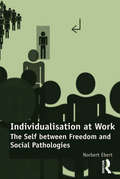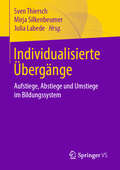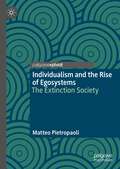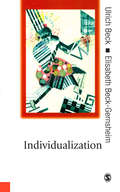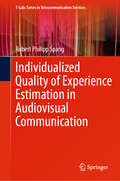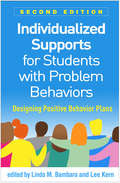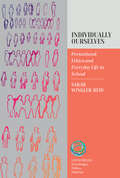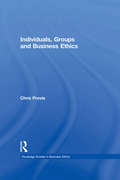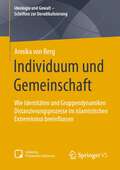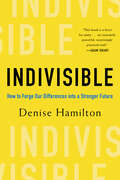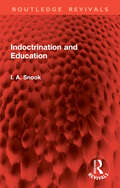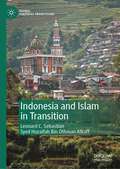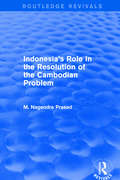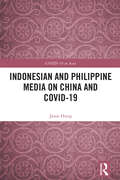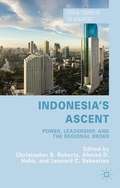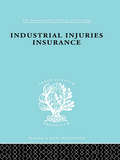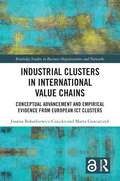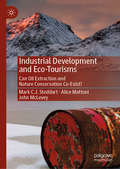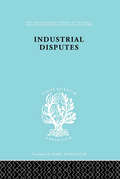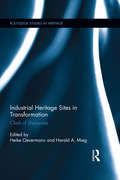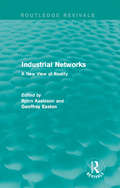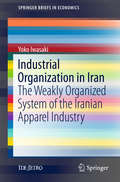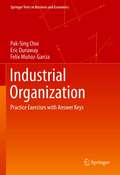- Table View
- List View
Individualisation at Work: The Self between Freedom and Social Pathologies
by Norbert EbertIndividualisation has become an ambiguous, but defining feature of late modern societies and while it is in part characterised by an increase in individual autonomy and a sense of liberation, individuals are equally required to negotiate a fragmented, pluralised and ambiguous social order by themselves. This book sheds light on the processes and nature of contemporary individualisation, specifically exploring the manner in which it unfolds under conditions of contemporary network capitalism. With attention to the modern workplace, where the individual and the organisation meet directly, but also in the wider community, Individualisation at Work reveals individualisation to become an ideological and ambiguous process of liberation, as conditions of marketisation and corporatisation transform the emancipatory qualities and motivations that define individualisation into a means for the coordination and reproduction of systemic imperatives, which are realised by individuals' qualities and capacities for self-realisation. A rigorous theoretical study, illustrated with interview material gathered amongst managers from internationally operating corporations, this book will appeal to sociologists with interests in work and organisations and the theory of contemporary modernity.
Individualisierte Übergänge: Aufstiege, Abstiege und Umstiege im Bildungssystem
by Julia Labede Sven Thiersch Mirja SilkenbeumerDer vorliegende Band widmet sich der Frage, wie Auf-, Ab- und Umstiege im Bildungssystem organisiert sind, in verschiedenen Entwicklungsphasen und Sozialisationsräumen zustande kommen und von den Akteuren gedeutet werden. Diese Bildungsverläufe sind erst ansatzweise erforscht und diskutiert worden. In der Schul- und Bildungsforschung orientiert man sich nach wie vor stark an Normal(bildungs)laufbahnen und fokussiert die institutionell normierten Übergänge, um Bildungsbeteiligung, Bildungserfolg und soziale Bildungsungleichheiten zu untersuchen. Die Beiträge dieses Buches stellen demgegenüber unterschiedliche Theoriepositionen und aktuelle Ergebnisse zu den Dynamiken und Prozessen der Aneignung und Bewältigung individualisierter Übergänge dar. In diesem Zusammenhang werden Herausforderungen für die Bildungsforschung und Fragen zur pädagogischen Gestaltung dieser Übergangsformen formuliert.
Individualism and the Rise of Egosystems: The Extinction Society
by Matteo PietropaoliThis book is a socio-philosophical journey across several aspects of our society’s focus on individual freedom, taking cues from some of the most prominent thinkers of our time. The auhtor posits that the human quest for freedom (mostly dominated by the Western culture but by no means confined to the West) has reached its ultimate paradox of making contemporary humans fundamentally unable to act as ecosystems (thus cooperate and collaborate). They have become egosystems, completely centred on the attainment of their own individual satisfaction. The author sees this as the culmination of a rightful quest for self-affirmation, which has been a key driver of progress across human history and by no means a negative one. But the paradox is that such a human-centred notion of freedom and individual accomplishment results in a much reduced ability to operate in sync with others, at the time when mankind would need more cooperation, collaboration and selflessness to address the key challenges it faces (from climate change to inequalities). Through the examination of the broad and interdisciplinary themes typical of social philosophy and the most recent cultural studies, in direct confrontation with the thought of authors such as Lipovetsky and Bauman, Lasch and Beck, Ehrenberg and Han, this book examines shifts in cultural norms at the possible end of a millenary civilization.
Individualization: Institutionalized Individualism and its Social and Political Consequences (Published in association with Theory, Culture & Society)
by Ulrich Beck Elisabeth Beck-GernsheimIndividualization argues that we are in the midst of a fundamental change in the nature of society and politics. This change hinges around two processes: globalization and individualization. The book demonstrates that individualization is a structural characteristic of highly differentiated societies, and does not imperil social cohesion, but actually makes it possible. Ulrich Beck and Elisabeth Beck-Gernsheim argue that it is vital to distinguish between the neo-liberal idea of the free-market individual and the concept of individualization. The result is the most complete discussion of individualization currently available, showing how individualization relates to basic social rights and also paid employment; and concluding that in as much as basic rights are internalized and everyone wants to or must be economically active, the spiral of individualization destroys the given foundations of social co-existence.
Individualized Quality of Experience Estimation in Audiovisual Communication (T-Labs Series in Telecommunication Services)
by Robert Philipp SpangThe book presents an in-depth exploration of the Individuality Assisted Estimation (IAE) model in the context of Quality of Experience (QoE) assessment for multimedia, specifically audiovisual communication. The book delves into how individual characteristics, including psychological traits and states, influence perceptions of multimedia quality. The book argues for the integration of individual differences into these assessments, hypothesizing that this approach can enhance the accuracy and relevance of QoE ratings. Through a series of experiments and analyses, the book rigorously evaluates the effectiveness of the IAE model, comparing it against traditional methods, and highlights its particular strengths in estimating task load. The research contributes to the field by emphasizing the importance of individuality in multimedia quality assessment and offering a practical, empirically validated approach for incorporating individual differences into QoE models.
Individualized Supports for Students with Problem Behaviors, Second Edition: Designing Positive Behavior Plans (The\guilford School Practitioner Ser.)
by Linda M. Bambara Lee KernNoted for providing everything needed to develop individualized positive behavior support (PBS) plans for students with pervasive behavioral challenges, this authoritative guide has been revised and expanded to reflect 15 years of changes in the field. The book walks practitioners through the PBS process, emphasizing a team-based approach and presenting assessment procedures, intervention strategies, and guiding questions. Detailed case examples illustrate ways to meet the diverse needs of students across abilities, grade levels (PreK–12), and problem behaviors. In a convenient large-size format, the book follows the sequence of a typical PBS course, making it ideal for use in teaching and training. New to This Edition *Incorporates current tools and practices within an expanded, whole-school PBS approach. *Chapters on multi-tiered systems of support and the fundamentals of classroom management. *Chapter on writing, monitoring, and evaluating a complete PBS plan. *Two extended case examples that run through many of the chapters. *&“Commentaries from the Field&” in which leading experts reflect on the contributions, challenges, and future directions of PBS.
Individually Ourselves: Personhood, Ethics, and Everyday Life in School (Lifeworlds: Knowledges, Politics, Histories #2)
by Sarah Winkler-ReidDrawing on ethnographic fieldwork in a London high school, Individually Ourselves demonstrates how young people elaborate notions of individual personhood through their friendships, and pervasive peer ethics, shaped in and through relations of power and inequality. By examining the interplay between ourselves and others during such a formative time of life, the book addresses how individuality is produced in everyday life and how our interactions help create the person we become.
Individuals, Groups, and Business Ethics (Routledge Studies in Business Ethics)
by Chris ProvisCorporate social responsibility has become a heavily discussed topic in business ethics. Identifying some generally accepted moral principles as a basis for discussion, Individuals, Groups, and Business Ethics examines ethical dimensions of our relationships with families, friends and workmates, the extent to which we have obligations as members of teams and communities, and how far ethics may ground our commitments to organisations and countries. It offers an innovative analysis that differentiates amongst our genuine ethical obligations to individuals, counterfeit obligations to identity groups, and complex role-based obligations in organised groups. It suggests that often individuals need intuitive moral judgment developed by experience, reflection and dialogue to identify the individual obligations that emerge for them in complex group situations. These situations include some where people have to discern what their organisations’ corporate social responsibilities imply for them as individuals, and other situations where individuals have to deal with conflicts amongst their obligations or with efforts by other people to exploit them. This book gives an integrated, analytical account of how our obligations are grounded, provides a major theoretical case study of such ethical processes in action, and then considers some extended implications.
Individuum und Gemeinschaft: Wie Identitäten und Gruppendynamiken Distanzierungsprozesse im islamistischen Extremismus beeinflussen (Ideologie und Gewalt - Schriften zur Deradikalisierung)
by Annika von BergIn der Extremismusforschung herrscht wenig Konsens darüber, was genau Distanzierungs- und Ausstiegsprozesse ausmacht. Was jedoch feststeht, ist, dass es nicht „den einen“ Weg aus dem Extremismus gibt. Mit diesem Theoriemodell wird angestrebt, die zahlreichen Wege aus dem Extremismus in einem Theoriegerüst zusammenzufassen und dabei einen Aspekt ganz besonders zu fokussieren: Die Rolle von Identität und Gruppendynamiken.Während sich der erste Teil der Publikation mit der Entwicklung der theoretischen Grundlage beschäftigt, beschreibt der zweite Teil die Anwendung der entwickelten theoretischen Grundlage auf Menschen, die ihren Weg aus dem religiös begründeten Extremismus gefunden haben.Insgesamt lässt sich erkennen, dass Gruppendynamiken eine zentrale Rolle in der Entscheidung, sich von extremistischen Einstellungen und Handlungsweisen zu distanzieren, spielen. Verschiedene Identitäten sind hierbei ebenfalls ein ausschlaggebender Faktor für eine Distanzierung, mehr noch: sie sind wichtig für eine langfristige und nachhaltige Abkehr vom Extremismus.
Indivisible: How to Forge Our Differences into a Stronger Future
by Denise HamiltonDenise Hamilton helps readers unpack their preconceived notions and reimagine a world that’s better than just “inclusive.” Denise Hamilton has always believed in the power and promise of a word she learned as a schoolgirl: “indivisible.” In her groundbreaking debut, she challenges readers to move beyond current notions of diversity and inclusion to build communities, workplaces, and relationships that live up to that word. She urges us to reexamine long-held beliefs and habits and to dismantle hierarchies that shape our current society. If we want to repair the fraying stitches that bind us together, if we want to build a truly close-knit collective, we cannot settle for our present approach. It’s time to recalibrate and identify a goal higher than inclusivity—the goal of indivisibility. As a nationally recognized DEI leader, Hamilton shares accessible, personal stories and offers self-examination questions, intentional action steps, and journal prompts. While the book has a focus on business and leadership, the lessons within can transform our professional and personal lives.
Indoctrination and Education (Routledge Revivals)
by I. A. SnookThe term ‘indoctrination’ is generally used to express disapproval of what someone is doing to the minds of children. The democrat uses it to condemn communist schools, the humanist to criticize programmes of religious instruction, the liberal to protest at the inculcation of racist attitudes.If the term is to function in educational theory in a meaningful way, it cannot remain merely a term of abuse devoid of any definite connotation. Its meaning must be carefully specified. First published in 1972, Indoctrination and Education (now with a new preface by John O’Neill and Josie Snook) provides an extended analysis of the term ‘indoctrination’ in order to discover the distinction between education and indoctrination.In the first two chapters, the author considers some of the strategies that have been used in attempts to make this distinction and indicates some of the problems in these attempts. In chapter three, he sets out his own analysis and in chapter four he relates this to the teaching of religion. In chapter five, he shows how ‘indoctrination’ is related to other educational concepts and to other concepts denoting persuasive techniques such a ‘propaganda’ and ‘brainwashing’. This book is a must read for anyone concerned with the study of education and educational theory and practice.
Indonesia and Islam in Transition (Global Political Transitions)
by Leonard C. Sebastian Syed Huzaifah Othman AlkaffThis book focuses on Islam in Indonesia, showcasing the wide range of Muslim organisations, belief systems and movements, together with an analysis of the political behaviour of Indonesian Muslims. It includes an investigation of the structure of groups, organizations, and societies, and how Muslims within the archipelago interact within these contexts. In doing so, it promotes a more nuanced understanding of Indonesian Muslim society by approaching it through the utilisation of scholarly frameworks. Theories related to religion and society are used, especially in characterising the transition of the Indonesian Muslim society from pre-New Order to post-New Order. Particularly significant is Abdullah Saeed's framework in understanding one’s attitude towards key and contemporary issues, originally used to understand one’s attitude towards the religious ‘other’. The authors thus adopt this framework in the book, as a method of categorising people in a diverse society which in turnhelps readers to understand the nuances of Islam and Muslims in a huge country like Indonesia.
Indonesia's Role in the Resolution of the Cambodian Problem (Routledge Revivals)
by M Nagendra PrasadThis title was first publishde in 2001. The author explores the role of "peackemaker" that Indonesia volunteered to play by way of resolving the complex Cambodian conflict. He examines what motivated Indonesia; how far the country lived up to ASEAN expectations; and whether the country succeeded as a mediator.
Indonesian and Philippine Media on China and COVID-19 (COVID-19 in Asia)
by Jason HungThis book studies Indonesian and Philippine English-language printed media outlets to examine how regional public opinions of China and China-made vaccines progressed amid the coronavirus pandemic. By quantifying the presence of certain words, themes, and concepts within the qualitative, textual data of news articles from the most prominent English newspapers in Indonesia (i.e. The Jakarta Post) and the Philippines (i.e. The Philippine Daily Inquirer), the book investigates the trajectories of the regional narratives on Chinese vaccines, Beijing, and China. Through this same methodology, the book also explores indications of the degree of soft power exerted by Beijing through such media outlets in both Indonesia and the Philippines. Analysing how Sino-Southeast Asian relations changed during the COVID-19 pandemic, this book will be a valuable resource to students and scholars of international relations, media studies, and Asian politics.
Indonesia’s Ascent
by Christopher B. Roberts Ahmad D. Habir Leonard C. SebastianThis volume explores the domestic and transnational considerations associated with Indonesia's ascent, referring to its rise in terms of hard and soft power and its likely trajectory in the future. The range of contributors analyse economic resources, religious harmony, security, regional relations, leadership and foreign policy.
Indust Injuries Insur Ils 152 (International Library of Sociology)
by A. F. YoungFirst published in 1998. Routledge is an imprint of Taylor & Francis, an informa company.
Industrial Clusters in International Value Chains: Conceptual Advancement and Empirical Evidence from European ICT Clusters (Routledge Studies in Business Organizations and Networks)
by Marta Gancarczyk Joanna Bohatkiewicz-CzaickaClusters are considered crucial nodes in the ongoing transformation of international value chains (IVCs). Due to technological advancements and external shocks, such as pandemic and political conflicts, value chains (VCs) have been spatially and functionally shortening, and clusters are well suited to address the resulting demand for more diversified and higher value-adding activities in geographical proximity, such as European economic area. However, clusters differ in their positions and capability to advance in IVCs, which induces the research problem of the conditions for cluster upgrading (CU). This monograph aims to develop a theoretical framework for regional CU and empirically verify this framework based on ICT clusters in Europe. It advances the theory of upgrading by linking the VC governance and capability approaches, broadening the empirical evidence on the conditions of CU, and providing policy recommendations. The unique value of the findings from research and practice results in the identification of the determinants for CU and conceptualizes them into new theoretical constructs of the sufficient Framework Conditions and the necessary and sufficient Public-Private Knowledge Governance. Our empirical basis is European clusters in ICT, an industry being one of the Key Enabling Technologies (KETs) for innovation and VC transformation.The Open Access version of this book, available at http://www.taylorfrancis.com, has been made available under a Creative Commons Attribution-Non Commercial-No Derivatives (CC-BY-NC-ND) 4.0 license.
Industrial Development and Eco-Tourisms: Can Oil Extraction and Nature Conservation Co-Exist?
by Alice Mattoni Mark C.J. Stoddart John McLeveyThis book examines the “oil-tourism interface”, the broad range of direct and indirect contact points between offshore oil extraction and nature-based tourism. Offshore oil extraction and nature-based tourism are pursued as development paths across the North Atlantic region. Offshore oil promises economic benefits from employment and royalty payments to host societies, but is based on fossil fuel-intensive resource extraction. Nature-based tourism, instead, is based on experiencing natural environments and encountering wildlife, including whales, seals, or seabirds. They share social-ecological space, such as oceans, coastlines, cities and towns where tourism and offshore oil operations and offices are located. However, they rarely share cultural or political space, in terms of media coverage, public debate, or policy discussion that integrates both modes of development. Through a comparative analysis of Denmark, Iceland, Newfoundland and Labrador, Norway, and Scotland, this book offers important lessons for how coastal societies can better navigate relationships between resource extraction and nature-based tourism in the interests of social-ecological wellbeing.
Industrial Disputes Ils 151 (International Library of Sociology)
by J. E. EldridgeFirst published in 1998. Routledge is an imprint of Taylor & Francis, an informa company.
Industrial Heritage Sites in Transformation: Clash of Discourses (Routledge Studies In Heritage Ser.)
by Harald A. Mieg Heike OevermannThe management of industrial heritage sites requires rethinking in the context of urban change, and the issue of how to balance protection, preservation/conservation, and development becomes all the more crucial as industrial heritage sites grow in number. This brings into play new challenges—not only through the known conflicts between monument preservation and contemporary architecture, but also with the increasing demand for economic urban development by reusing the built heritage of former industrial sites. This book explores the conservation and change of industrial heritage sites in transformation, presenting and examining ten European and Asian case studies. The interdisciplinary approach of the book connects a diversity of rationales and discourses, including monument protection, World Heritage conventions, urban regeneration, urban planning and design, architecture, and politics. This is the first book to deepen the understanding of industrial heritage site management as a networked, multi-dimensional task involving diverse social agents and societal discourses.
Industrial Networks (Routledge Revivals): A New View of Reality
by Björn Axelsson Geoffrey EastonFirst published in 1992, this volume brings together contemporary studies and reviews the research which established the study of networks as an area in its own right. By looking at the foundations of industrial networks and analysing network methodology and modelling, this book offers an integrated and coherent approach to the whole area. Covering small group analysis, network change processes and implications for business strategy, and presenting new ways to exploit inter-organisational relationships in the face of change, it tackles key issues with important implications for the future. This book will be of interest to students of economics and business.
Industrial Organization
by Paul Belleflamme Martin PeitzDigital technology has dramatically changed the structure of many industrial sectors. The rise of the Internet and increased broadband access have given rise to new business models andstrategies for firms dealing with both electronic and physical goods. Industrial Organization andthe Digital Economy focuses on changes in the two industries most affected by the new technology:software and music. The book offers the theoretical and factual grounding necessary forunderstanding the changes in industrial organization brought about by the digital economy, with thechapters together providing an accessible and interesting cross-fertilization of fact and theory. Moreover, two chapters demonstrate the relevance of the emerging literature on two-sided markets forthe digital economy. The contributors consider such topics as the innovation value of software;empirical evidence and theoretical analysis regarding the impact of file sharing on music sales; theability of firms to modify their products and offer them in different versions; the practice ofpreannouncing information goods; the effects of electronic commerce on both consumers and retailers;and price-setting by electronic mediators. The studies in Industrial Organization and the DigitalEconomy provide a valuable starting point for future research on other aspects of the subject,including the open-source movement and trust and reputation. Contributors:Paul Belleflamme, Jay PilChoi, Emin M. Dinlersoz, David S. Evans, Chaim Fershtman, Neil Gandal, Amit Gayer, Andrei Hagiu,Gerhard Illing, Bruno Jullien, Eirik Gaard Kristiansen, Stan J. Liebowitz, Jae Nahm, Martin Peitz,Pedro Pereira, Richard Schmalensee, Oz Shy, Patrick Waelbroeck
Industrial Organization in Iran
by Yoko IwasakiThis book focuses on Iran to explore the question of how the nature of industrial organizations and the whole system they constitute can exert a great influence on an industry's competitiveness and resilience. The author examines what happens if firms and companies participating in the manufacturing and distribution process of a certain product are not organized to a high degree and operate independently. The book begins with an inquiry into the historical environment of Iran's apparel industry, which has never been stable. It then reveals the specific practices that enable firms to maintain their independent business, and argues that the elastic state of the production and distribution system has worked for the survival of self-reliant member firms. The typical Iranian apparel firm persists in maintaining independent operations regardless of its size, a practice that is inimical to the development of long-lasting business relations with other firms as well as to vertical integration between firms, in all stages from production to distribution. A distinguishing feature of Iran's apparel industry is that the member firms are barely organized compared with their counterparts in advanced industrialized countries. Despite such a weakly organized system, generally small-scale but self-reliant Iranian firms courageously persist in the face of the market's difficulties. Superficially, it appears that Iran's apparel market is being filled with Chinese goods, but the reality is somewhat different. Apparel firms that are currently doing business with China but are ready to terminate it at any time are taking advantage of newly emerging opportunities to ensure the survival of their own businesses. Reopening those businesses for domestic operations remains an ever-present possibility for them.
Industrial Organization: Minds, Bodies, and Epidemics
by Li Way LeeThis book takes the reader on a new tour of the world of firms. We start with a visit to the inside of a firm. We meet the owner and the manager. We look deeply into their mindsets. Then we move outside the firm, to observe the firm's outer features. We pay particular attention to its size, its complexity, its fragility, and its similarity to other firms. In the second half of the tour, we visit communities of firms. We watch waves of mergers, chaos, and bubbles. Before returning, we witness battles between firms and creatures that act like antibodies in our blood: corporate raiders, antitrust agencies, and creative destructors. Throughout the tour, we ask how the things we see are linked. This book encourages the reader to see them as feedback loops. The book’s overarching argument is the importance of the separation of ownership and control and how society must pay more attention to the concept..
Industrial Organization: Practice Exercises with Answer Keys (Springer Texts in Business and Economics)
by Pak-Sing Choi Eric Dunaway Felix Muñoz-GarciaThis textbook presents 122 exercises on industrial organization with detailed answer keys. While most textbooks on industrial organization focus on theory and empirical findings, this textbook offers practical examples and exercises helping predict firm behaviour in different industries. The book emphasizes the game-theoretic tools used in each type of exercise, so students can systematically apply them to other markets, forms of competition, or information environments where firms, consumers, and regulating agencies interact. The book begins with examples that analyse different models of firm behavior and interaction; starting with monopoly and moving through the Cournot model of simultaneous quantity competition, the Bertrand model simultaneous price competition, and sequential competition. The following chapters apply game-theoretic tools to situations of increasing complexity: regulation; R&D incentives; mergers and collusion; bundling incentives; incomplete information, signalling, and competition; networks and switching costs. In addition to providing algebraic simplifications, some chapters also offer the unique feature of worked exercises based on published journal articles by leading scholars in the field. Finally, exercises are ranked according to their difficulty, with a letter (A-C) next to the exercise number, which allows students to pace their studies and instructors to structure their classes accordingly. Providing a rigorous, yet practical introduction to the field of industrial organization, this textbook is appropriate for advanced undergraduate and graduate students in economics and finance.
